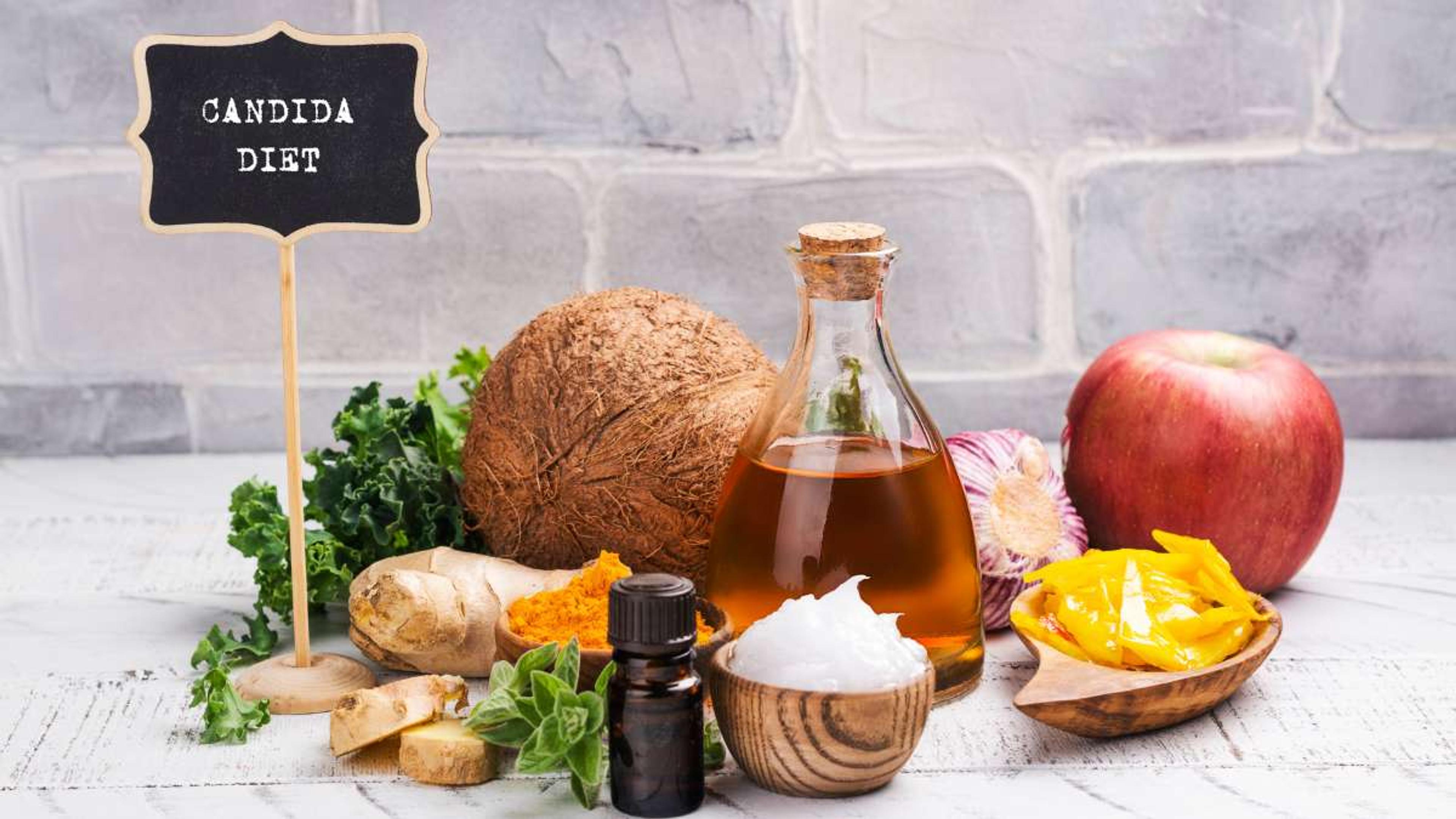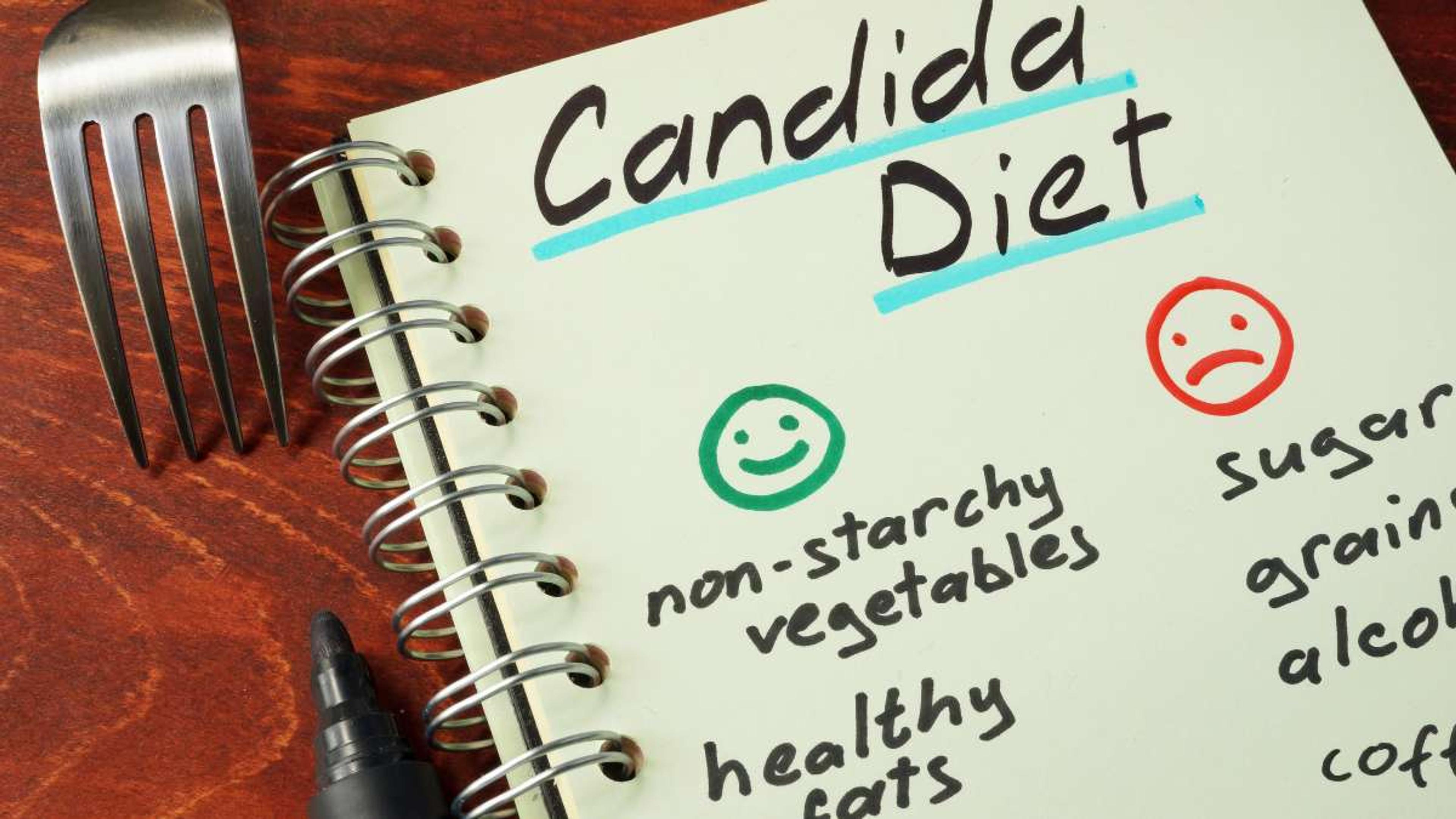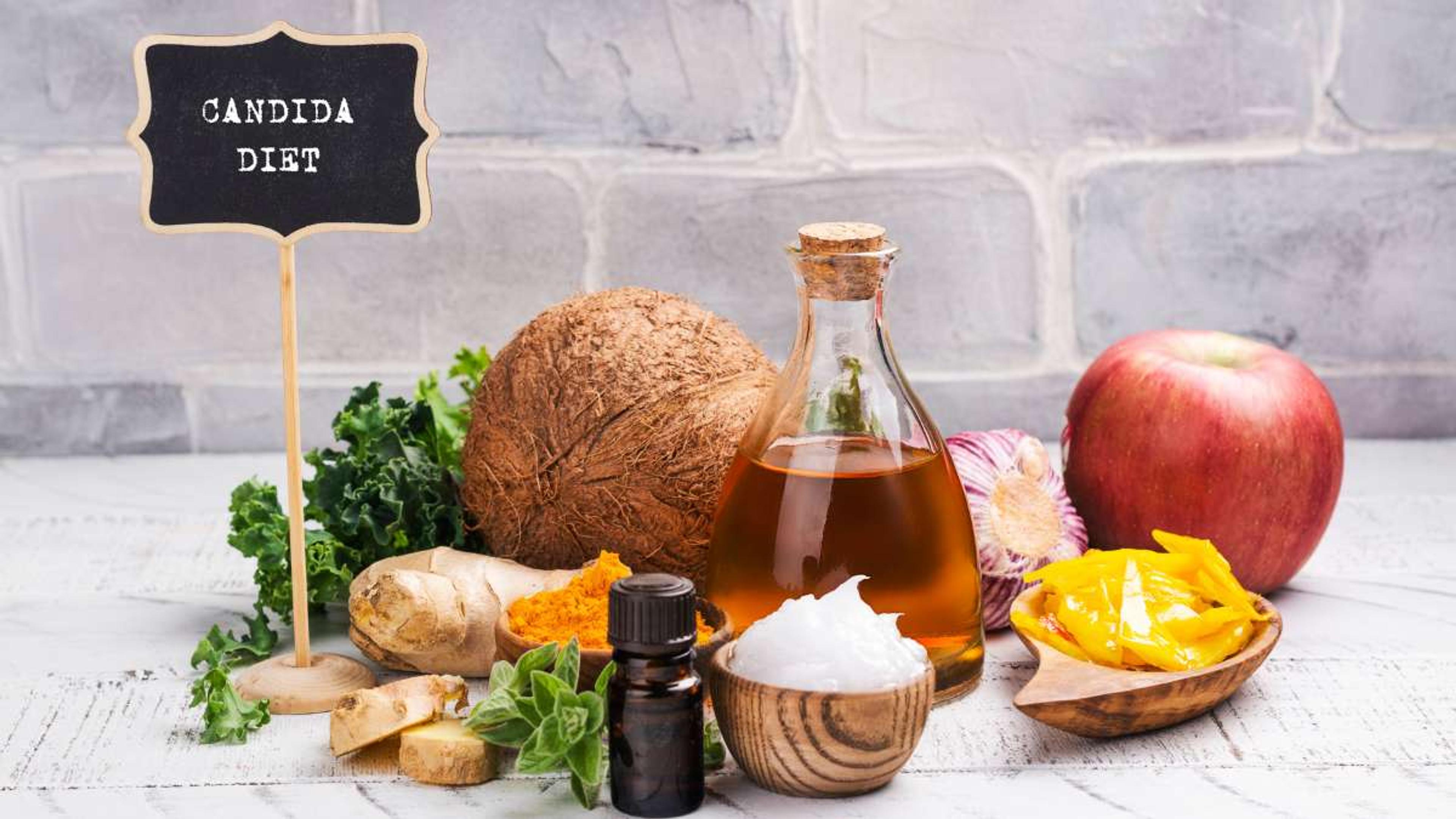The Ultimate Vegan Diet for Candida Treatment

- Key Takeaways
- Understanding Candida and its Effects
- 3 Benefits of a Vegan Diet for Candida
- Following a Vegan Candida Diet
- Supporting Gut Health on a Vegan Candida Diet
- 4 Tips for Following a Vegan Candida Diet
- Conclusion
- FAQs
Struggling with the symptoms of candida overgrowth can feel overwhelming and confusing. Did you know that changing your diet to a vegan one can help control this condition? In this informative guide, we will delve into understanding Candida yeast including its effects on the body, how a vegan diet fits in managing it and practical tips to follow such dietary plan.
Ready to embark on the journey towards better gut health? Let's get started!
Key Takeaways
- Candida overgrowth is an imbalance of yeast in the body that can cause health problems like digestive issues and weakened immune function.
- A vegan diet can help manage candida overgrowth by eliminating foods that promote yeast growth, promoting a healthy gut microbiome and immune system, and reducing inflammation in the body.
- Foods to avoid on a vegan candida diet include processed meats, sugary foods, gluten-containing grains, dairy products, high-starch vegetables, alcohol, and certain fruits.
- Foods to include on a vegan candida diet include coconut oil, garlic and onions, non-starchy vegetables, fermented foods like sauerkraut and kimchi, non-glutenous grains like quinoa and buckwheat, low-sugar fruits like avocados.
- Balancing protein intake with plant-based sources is crucial on a vegan candida diet for optimal nutrition.
- Supporting gut health on a vegan candida diet involves including probiotics and prebiotics through nondairy yogurt or fermented foods like kimchi. Healthy fats such as avocados and nuts are also important for gut health.
Understanding Candida and its Effects

Explaining candida overgrowth and its impact on health
Candida is a type of yeast. It lives in our body, particularly in the gastrointestinal tract and on the skin, without causing harm.
But sometimes, it can grow too much under certain conditions. This is called candida overgrowth. Candida overgrowth refers to an imbalance of yeast in the body, which can lead to various health issues such as oral thrush, digestive problems, and weakened immune function. Medicines like antibiotics and eating lots of sugar can make it happen.
Too much candida messes up your gut health and affects how well your body takes in nutrients from food. It can also make some belly problems worse, such as ulcerative colitis and Crohn's disease.
Discussing common symptoms and complications of candida
Candida overgrowth gives you bad signs. You might feel tired all the time. Your joints may hurt and your skin could get infected. Some people have sinus infections that won't go away. You might experience an oral thrush where you would notice white, creamy patches on the tongue, inner cheeks, and other areas of the mouth which can cause discomfort, difficulty swallowing, and a slightly metallic taste.
Candida overgrowth in the gastrointestinal tract can lead to digestive symptoms such as bloating, gas, abdominal pain, and diarrhea. It can also interfere with nutrient absorption and digestion. Some people might experience cognitive symptoms such as difficulty concentrating, memory problems and overall mental fogginess (sometimes referred to as "Candida brain fog".
Digestive issues are common too, like belly pain or trouble going to the bathroom. Bad mood swings, food upsets, and toe fungus can happen as well. You need to know these signs because an unchecked candida growth can wreak havoc on your health.
It's important to note that while these symptoms and complications are associated with Candida overgrowth, they can also be caused by other underlying conditions. If you suspect you have Candida-related issues, it's advisable to consult a healthcare professional for accurate diagnosis and appropriate treatment.
3 Benefits of a Vegan Diet for Candida
A vegan diet can provide several benefits for individuals with candida overgrowth, including eliminating potential food triggers, promoting a healthy gut microbiome and immune system, and reducing inflammation in the body.

1. Eliminating potential food triggers for candida overgrowth
Candida grows fast with certain foods. A vegan diet helps stop this. A vegan diet can provide an effective approach to managing candida overgrowth by excluding common trigger foods. By cutting out animal products and dairy, which can potentially exacerbate candidiasis, individuals can create an environment less conducive to yeast overgrowth. Additionally, the emphasis on whole plant foods rich in fiber and nutrients supports gut health, helping to rebalance the microbiome and reduce the risk of candida-related symptoms.
You would also need to cut out other foods that can make candida grow more. Yeast, sugar, fruits and vegetables that have high amounts of starch or sugar help the yeast to grow more in your body. You can learn more about this, so keep reading.
2. Promoting a healthy gut microbiome and immune system
A vegan diet can promote a healthy gut microbiome and immune system. A diverse and stable microbial system in the gut is important for overall health. The gut microbiota plays a crucial role in digesting nutrients, forming the intestinal barrier, and regulating the immune system.
By consuming a plant-based diet rich in fiber and fermented foods, you can establish a diverse microbiome that produces vital metabolites. On the other hand, diets high in fat and animal proteins can negatively impact gut microbes.
Vegetarian and vegan diets have been shown to have beneficial effects on the gut microbiota, helping to support a healthy gut microbiome and improve immune function.
3. Reducing inflammation in the body
A vegan diet can help reduce inflammation in the body. Inflammation is linked to various health issues, including candida overgrowth. By eliminating animal products and focusing on plant-based foods, you can lower inflammation levels.
Vegan sources like flaxseed and chia seeds contain omega-3 fatty acids, which are known for their anti-inflammatory properties. Additionally, consuming fermented foods rich in probiotics, such as sauerkraut and kimchi, may also help manage candida symptoms and promote a healthy gut microbiome.
Following a Vegan Candida Diet
To successfully follow a vegan candida diet, it is important to avoid certain foods that can contribute to candida overgrowth and include nutrient-dense options that support gut health.

Foods to avoid
To help manage candida overgrowth, it's important to avoid certain foods. Here are some foods that should be avoided:
- Processed meats and packaged foods: These can contain additives, preservatives, and ingredients that may feed candida.
- Sugary foods and sweeteners: Avoid foods with added sugars such as fruit juices, syrups, and high-sugar fruits. Also, stay away from artificial sweeteners like stevia and xylitol.
- Gluten-containing grains: Foods like wheat, barley, rye, and spelt can contribute to inflammation and worsen candida symptoms.
- Mold-prone nuts: Some nuts like peanuts and cashews can have higher mold content, which can aggravate candida overgrowth.
- Dairy products: Milk, cheese, and other dairy products contain lactose, which may contribute to inflammation in the body.
- High-starch vegetables: Vegetables like potatoes, carrots, corn, and peas are higher in starch content and can increase blood sugar levels.
- Alcohol: Alcoholic beverages can disrupt gut flora balance and promote yeast growth.
- Processed and refined foods: Foods high in refined carbohydrates like white breads and pastries should be avoided as they can spike blood sugar levels.
- Certain fruits: Fruits with high sugar content such as ripe bananas, grapes, cherries, mangoes should be limited or avoided during a candida diet.
- Condiments containing vinegar or soy sauce: These condiments often contain yeast or soybean ingredients that can worsen candida symptoms.
Foods to include
When following a candida diet, it's important to focus on foods that are low in sugar and yeast. Here are 10 vegan foods that can be included in a candida-friendly diet:
- Non-Starchy Vegetables: Leafy greens, broccoli, cauliflower, zucchini, cucumber, asparagus, spinach and bell peppers are excellent choices as they are low in sugar and provide essential nutrients. Other veggies include onion, garlic ginger and fermented foods such as sauerkraut and kimchi.
- Low-Sugar Fruits: Berries like strawberries, blueberries, raspberries, and blackberries are lower in sugar and can be consumed in moderation. Lemon juice is great too!
- Gluten-Free Grains: Quinoa, brown rice, millet, and amaranth are gluten-free grains that can be included in the diet for fiber and energy.
- Legumes: Lentils, chickpeas, black beans, and other legumes are good sources of plant-based protein and fiber, without being overly starchy.
- Healthy Fats: Avocado, coconut oil, olive oil, and flaxseeds are rich in healthy fats that can provide satiety and support overall health.
- Nuts and Seeds: Almonds, walnuts, chia seeds, and flaxseeds can be consumed in moderation for additional nutrients and healthy fats.
- Herbs and Spices: Garlic, ginger, turmeric, oregano, and cinnamon have potential antifungal properties and can enhance the flavor of candida-friendly meals.
- Non-Dairy Yogurt: Unsweetened coconut or almond yogurt with live probiotic cultures can support gut health and balance the microbiome.
- Non-Dairy Milk: Unsweetened almond, coconut, or hemp milk can be used as dairy substitutes in recipes and beverages.
- Green Tea: Green tea is a low-caffeine beverage that offers antioxidants and potential antifungal properties to support candida management.
Importance of balancing protein intake
Balancing protein intake is crucial when following a vegan Candida diet. Protein is important for the growth and repair of tissues, and it plays a key role in supporting overall health.
It helps to maintain healthy muscles, bones, and organs. By including sources of plant-based proteins such as legumes (like lentils and chickpeas), tofu, nuts, and quinoa in your diet, you can ensure that your body gets the essential amino acids it needs.
It's also important to note that pea protein is a popular choice among individuals following a vegan Candida diet because it contains high levels of protein while being low in allergens.
Supporting Gut Health on a Vegan Candida Diet
To support gut health on a vegan candida diet, incorporating probiotics and prebiotics, fermented foods, and healthy fats and spices is essential. These strategies help maintain a balanced microbiome and promote optimal digestion.
Read more to discover how to nourish your gut while following a vegan candida diet.
Probiotics and prebiotics
Probiotics are good bacteria that can help fight fungal overgrowth and reduce the risk of Candida infection on a vegan Candida diet. Vegan options for probiotics include non-dairy yogurt, kimchi, sauerkraut, or water kefir.
Fermented foods
Fermented foods are a great addition to a vegan candida diet. They offer many benefits for gut health and can help fight against Candida. Some examples of fermented foods include sauerkraut, kimchi, kefir, tempeh, natto, kombucha, miso, and probiotic yogurt. These foods provide probiotics, which are beneficial bacteria for gut health. By including fermented foods in your diet, you can boost digestion and promote overall health. Additionally, a diet rich in fermented foods can increase the alpha diversity of the gut microbiome and support a healthy balance of bacteria in your digestive system.
Healthy fats and spices
Healthy fats and spices are important components of a vegan Candida diet. They provide essential nutrients and flavor to meals while supporting gut health. Here are some examples:
- Avocado: Rich in healthy fats and fiber, avocados can be added to salads or used as a spread.
- Seeds: Flax seeds, pumpkin seeds, and sunflower seeds are good sources of healthy fats and can be sprinkled on salads or added to smoothies.
- Nuts: Almonds and cashews are tasty options that provide healthy fats and protein. They can be enjoyed as snacks or used in recipes.
- Olive oil: This heart-healthy oil can be used for cooking or as a dressing for salads.
- Spices: Ginger, garlic, and turmeric have anti-inflammatory properties that can support gut health. They add flavor to dishes while providing health benefits.
4 Tips for Following a Vegan Candida Diet
Cook meals in bulk and plan ahead to ensure you have nutritious options readily available. Stay hydrated and incorporate probiotic supplements into your routine. Maintain a balanced diet and seek guidance from medical professionals for optimal results.

1. Practical tips for cooking, meal planning and preparation
- Plan your meals ahead of time to ensure you have all the necessary ingredients.
- Experiment with new vegan recipes to keep your meals interesting and flavorful.
- Use herbs and spices to add flavor to your dishes without relying on added sugars or unhealthy fats.
- Opt for simple cooking methods like steaming, baking, or sautéing instead of deep - frying.
- Prep your ingredients in advance by washing and chopping fruits and vegetables, so they're ready to use when you need them.
- Cook in bulk and freeze leftovers for quick and easy meals on busy days.
- Keep a well - stocked pantry with staples like whole grains, legumes, nuts, seeds, and spices.
- Be mindful of portion sizes to avoid overeating and maintain a healthy weight.
- Listen to your body's hunger cues and eat when you're truly hungry rather than out of boredom or emotional triggers.
- Stay hydrated by drinking plenty of water throughout the day.
2. Importance of probiotic supplementation and staying hydrated
Probiotic supplements are important for a vegan Candida diet because they help crowd out harmful bacteria and yeast in the gut. These supplements can boost your immune system and protect the good bacteria in your gut.
They also improve digestion and can help manage symptoms of irritable bowel syndrome (IBS). Staying hydrated is crucial too, as it promotes overall digestive health, helps flush out toxins, and supports the body's natural processes.
So make sure to drink plenty of water throughout the day to stay properly hydrated while following a vegan Candida diet.
3. Overcoming challenges and maintaining a balanced and nutrient-rich diet
Maintaining a balanced and nutrient-rich vegan candida diet can have its challenges, but it is possible with some strategies. Firstly, it's important to plan your meals ahead of time and focus on whole foods that are low in sugar and refined carbohydrates.
This means avoiding processed foods and sugary snacks that can promote yeast growth. Secondly, make sure to include a variety of non-starchy vegetables like kale, spinach, broccoli, and asparagus for essential vitamins and minerals.
Additionally, incorporating plant-based protein sources such as lentils, quinoa, almonds, and sunflower seeds can help maintain a healthy balance in your diet. Lastly, remember the importance of staying hydrated by drinking enough water throughout the day.
4. Getting expert advice from a Medical Professional and Dietitian
It is important to seek expert advice from a medical professional and dietitian when following a vegan candida diet. They can provide valuable guidance on managing candida symptoms effectively while adhering to a vegan lifestyle.
Nao Medical offers a helpful guide on managing candida symptoms specifically for vegans, but it's always recommended to book an appointment with a medical professional or dietitian for personalized advice based on your individual needs and health conditions.
Their expertise will ensure that you are making the right dietary choices and getting the support you need to successfully follow a vegan candida diet. Including proteins like legumes and beans in your meals is especially important for maintaining proper nutrition on this type of diet.
Conclusion
In conclusion, a vegan diet can be beneficial in managing candida overgrowth. By eliminating potential food triggers and promoting a healthy gut microbiome, a vegan candida diet may help reduce inflammation and support overall health.
Remember to consult with medical professionals and dietitians for personalized guidance on following a vegan candida diet.
FAQs
1. Can a vegan diet help with Candida overgrowth?
Yes, a vegan diet can be beneficial for managing Candida overgrowth as it eliminates animal products that can contribute to inflammation and disrupt the balance of gut bacteria.
2. What foods should I avoid on a vegan diet for Candida?
To support candida treatment, it is recommended to avoid sugary foods, refined grains, processed snacks, alcohol, and high-starch vegetables like potatoes and corn.
3. Can I still get enough nutrients on a vegan diet while treating Candida?
Yes, it is possible to meet your nutrient needs on a vegan diet while treating Candida by including plenty of whole plant-based foods such as fruits, vegetables, legumes, nuts, seeds, and gluten-free grains.
4. Are there any specific foods that can help fight Candida on a vegan diet?
Yes! Incorporating anti-fungal foods like garlic, oregano oil, coconut oil or milk kefir into your vegan diet may help combat Candida overgrowth due to their natural properties.

